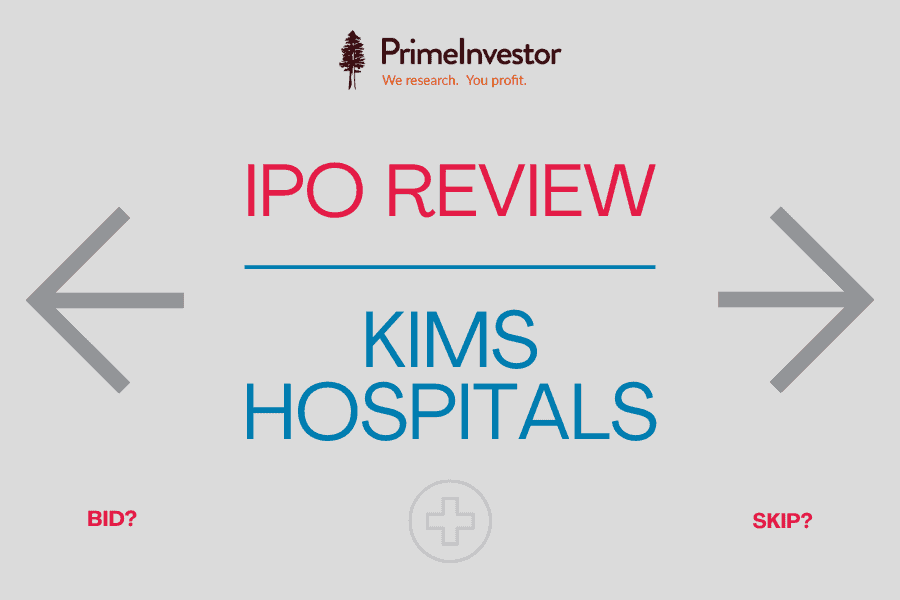KIMS Hospitals or Krishna Institute of Medical Sciences Hospital is a multi-speciality hospital chain with 9 centres, focused on the Andhra Pradesh-Telangana region. The KIMS Hospital IPO seeks to raise a sizeable Rs 2,143 crore (at the upper end of its price band of Rs 815-825). Of this, Rs 1943 crore is an offer for sale from PE investor General Atlantic, the promoters, and 44 other shareholders. The remaining will be used to pay off the already low borrowings and for general corporate purposes. Does the KIMS Hospital IPO make for a good long-term bet?

Issue valuations
The IPO is not an extremely expensive one. At the upper end of the band, the issue is priced at 32 times its FY21 EPS (on a diluted equity base). Most listed hospital chains are either lossmaking or have turned only small profits in FY-21. There’s no clear PE comparable; 3-year historical PE multiples of Apollo Hospitals have been several times higher, while that of Narayana Hrudayalaya and Shalby are much more expensive at 62.5 and 45 times. But KIMS Hospital works on a better EBITDA margin and ROE profile than these hospital chains.
But while its asking price is not prohibitive, there is no compelling case for this IPO at this time. There are several factors that need watching to know if the current performance can sustain.
Inorganic expansion a positive, but impact is unclear
KIMS Hospitals (KIMS) is a chain of 9 multi-specialty hospitals in the Andhra Pradesh-Telangana region. This gives it a regional hold; for institutions such as hospitals that often rely on goodwill and word-of-mouth, such regional presence brings steady footfalls. KIMS’ strategy thus far has been to build on that regional presence.
The hospital used the inorganic route to add to its bed count, using slump sales, service agreements, and acquisitions to add four hospitals and about 1200 beds to its count between 2017 and 2019. Its current bed count stands at 3,064 from the 2,804 in 2019. Hospital services have made up 55-60% of KIMS’ revenue and 32% comes from pharmacy sales.
KIMS plans to continue to use acquisitions of hospitals with similar multi-specialty functions to add to its count, or use asset-light models such as getting into service agreements. It however plans to move out of its regional hold and move into cities/states such as Chennai, Bangalore and greater Karnataka, Bhubaneswar, Indore, Aurangabad, Nagpur and Raipur. KIMS Hospitals is low on debt and has sizeable reserves, which can fund expansion plans.
The challenge: While the inorganic route will help KIMS Hospitals scale quickly, it must be noted that not all its acquisitions are fully owned by it; for instance, its Vizag and Kurnool hospitals are 51% and 55% subsidiaries. Two, moving into new markets has its own challenges. Markets such as Chennai and Bangalore already have several established hospital brands.
Breaking into regional hospital market share and attaining sufficient occupancy to break even at new locations can take time. Building up a reputation in healthcare is no small task. Other large hospital chains, including Apollo Hospitals, have found it hard to draw patients away from their tried-and-trusted local hospitals or chains when foraying into new geographies.
Three, how much expansion helps topline and earnings remains to be seen. KIMS Hospital, despite commanding 9 hospitals, still derives more than half its revenue only from its 1000-bed Secunderabad hospital. This branch also remains the most profitable; its patient volumes are only a third of the total for KIMS as a whole.
So though new hospitals could add to its presence, it may not necessarily translate into better revenue and earnings growth. The table below shows the hospital-wise numbers for 2021. The trends are similar in 2020 as well.
The inability of other hospitals to make meaningful contributions as of now indicates that the company is still dependent on a few locations. This is in fact true of most listed hospital chains where a flagship location contributes the bulk of cash flow and profits. Therefore, capital deployed to build or acquire hospitals may not pay off in quick time in terms of returns. And finally, the prospectus provides no timeline for when new capacities will come up. For now, thus, the Secunderabad hospital is likely to continue to be the cash cow.
Strong profit margins, but costs can rise
KIMS Hospitals clocked a whopping 39.7% EBITDA margin in FY-21. It was lower at 28.6% in the year before. Even so, these margins are higher than for those such as Apollo or Shalby. It has a positive operating cash flow, and has efficient asset turnover ratios compared to peers.
Revenues grew at a good CAGR of 18% between FY-19 and FY-21. While patient volumes dipped in FY-21 owing to the lockdown, given that it received more complex cases and those involving Covid, KIMS still managed to clock strong topline growth in FY-21. Average revenues per bed also saw strong growth in FY-21.
The challenge: Profit margins could moderate on a few counts from current levels. One, part of the increase in FY-21 margins came from lower doctor consultancy fees; several hospitals, including KIMS, have scaled down remuneration to doctors for cost control as patient volumes dipped. As a proportion of sales, consultancy expenses for KIMS amounted to about 22% in FY-19 and FY-20; it dropped to 19.8% in FY-21.
Two, other variable costs such as housekeeping, power, catering and the like dipped due to lower hospital activity during lockdowns. Normalised activity could send profit margins back down to the 19-21% levels in the years before. Three, KIMS may have to step up other spends such as advertising if it needs to break into new markets, which can further pull margins down.
Four, given the acquisitions KIMS has made in the past 3 years and the lack of enough financial performance history, it is hard to draw trends on expenses or how the company manages the high-cost structure that hospitals tend to have. Cost heads such as legal charges and write-off on trade receivables have seen sharp spikes in one year and none in others. While the company aims at stepping up home care services and other potentially higher-margin specialities, contribution from these avenues may still be low until scale is achieved.
Five, net profits have been uneven and therefore do not help draw performance conclusions. Profits were hit by losses booked on fair value calculations when PE investor General Atlantic infused capital and acquired shares of other investors. The company was loss-making at the net level in both FY-18 (as per the draft prospectus) and FY-19.
Hospitals, in general, have high-cost structures and are highly capital-intensive. They need a quick turnaround in patient stays, strong volumes, brand strength to attract and retain both doctors and patient loyalty. While KIMS Hospitals ticks some of the boxes and has expanded rapidly, the lack of clarity on further expansion, likely delays in improvements of hospitals outside its flagship branch, and uneven financials limit the IPO’s attractiveness. Listed hospital players who have earlier hit the market based on expansion plans have stumbled. It’s best to wait and watch to see if KIMS Hospitals turns out to be an exception.
Please note that this review does not take into consideration the possibility of listing gains.







8 thoughts on “IPO review – KIMS Hospitals”
is Kovai medical a close match ?
We haven’t analysed this company. But hospital chains in general can be compared. – thanks, Bhavana
accessible to only stock advise subscribed members?
Yes Sir. If you wish to upgrade your account, please follow the following steps:
1. Please login to your account.
2. Please go to https://staging.primeinvestor.in/my-account/subscriptions
3. Please click on the ‘View’ link for your subscription
4. In the next page, you will see a link to ‘Upgrade’ – please click on it and continue.
Thanks
Vidya
Thanks for the Analysis Bhavana.. Can this be compared to Health Care Global (listed)? If yes, how do you see HCG and KIMS? Does HCG look more promising?
Yes, KIMS can be compared to HCG. We haven’t done a thorough analysis of HCG in order to give a view on it. – thanks, Bhavana
As much I appreciate the writer’s effort to come up with a ‘ all boxes ticked’ article on this topic,some clear guidance would be highly appreciated, atleast for a novice like me it wil be of great help. Thanks.
As mentioned in the article, there is no compelling reason to invest in this IPO. We have also said it needs watching to see if performance sustains before taking a call. – thanks, Bhavana
Comments are closed.